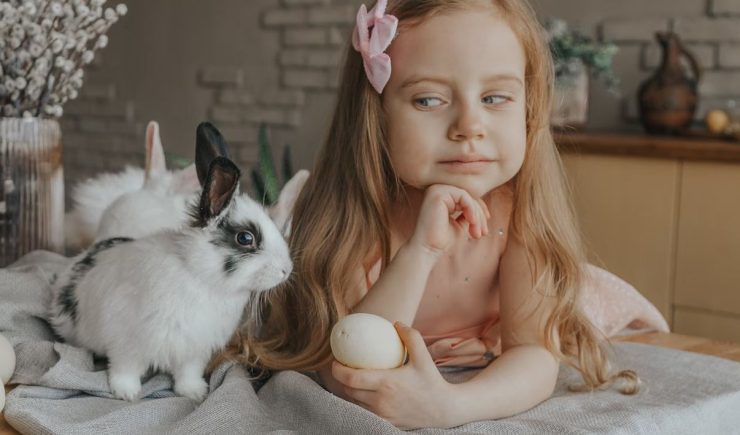Rabbits make great indoor pets. They are affectionate and intelligent and have unique personalities that make them great companions. to keep your indoor rabbit happy and healthy there are a few things you need to keep in mind. In this article, we’ll share some tips for keeping your indoor rabbit happy and healthy.
Indoor rabbits can be delightful companions, providing joy and comfort to their owners. However, ensuring that your indoor rabbit is happy and healthy requires attention to their specific needs. This article provides comprehensive tips on how to keep your indoor rabbit thriving.
Housing and Environment

Choosing the Right Cage
Selecting an appropriate cage is crucial. A rabbit’s cage should be spacious enough to allow for movement and play. The general recommendation is at least four times the size of the rabbit when it’s fully stretched out. Additionally, multi-level cages can offer more space and stimulation.
Space Requirements
Rabbits need more than just a cage; they require a designated area for exercise. This could be a rabbit-proofed room or a large pen. Ensure that the environment is safe and free from hazards such as electrical cords or toxic plants.
Safe and Stimulating Environment
Creating a stimulating environment is essential for your rabbit’s mental health. Provide tunnels, hiding spots, and a variety of toys to keep them engaged. Regularly rotating toys can help maintain their interest and prevent boredom.
Diet and Nutrition

Basic Dietary Needs
A balanced diet is critical for your rabbit’s health. Their diet should primarily consist of high-quality hay, which aids in digestion and keeps their teeth healthy.
Importance of Hay
Hay should make up about 80% of a rabbit’s diet. It provides essential fiber that promotes digestive health and prevents common issues like gastrointestinal stasis.
Fresh Vegetables and Fruits
In addition to hay, rabbits benefit from a variety of fresh vegetables. Leafy greens like kale, romaine lettuce, and cilantro are excellent choices. Fruits can be given as occasional treats but should be limited due to their high sugar content.
Water Requirements
Fresh water should always be available. Using a water bottle or a heavy bowl that can’t be tipped over ensures that your rabbit stays hydrated.
Foods to Avoid
Certain foods can be harmful to rabbits, including chocolate, avocado, and anything high in sugar or fat. Always research before introducing new foods to your rabbit’s diet.
Exercise and Play

Importance of Exercise
Regular exercise is vital for preventing obesity and promoting overall health. Aim to provide your rabbit with at least a few hours of exercise outside their cage each day.
Safe Indoor Activities
Set up obstacle courses or allow your rabbit to explore rabbit-proofed areas of your home. Supervised free roam time is beneficial for physical and mental stimulation.
Toys and Enrichment
Offer a variety of toys, such as chew toys, tunnels, and puzzle feeders. These not only keep your rabbit entertained but also help with dental health by encouraging natural chewing behaviors.
Health and Veterinary Care

Regular Health Checks
Routine vet visits are crucial for maintaining your rabbit’s health. A veterinarian can check for signs of illness and provide vaccinations.
Common Health Issues
Be aware of common health problems in rabbits, such as dental issues, gastrointestinal stasis, and respiratory infections. Early detection and treatment are key.
Vaccinations
Rabbits should be vaccinated against diseases like myxomatosis and rabbit hemorrhagic disease. Consult your vet for the appropriate vaccination schedule.
Dental Care
Rabbits’ teeth grow continuously, so providing chew toys and a proper diet helps prevent dental problems. Regular vet check-ups can help monitor their dental health.
Grooming and Hygiene

Grooming Basics
Regular grooming helps keep your rabbit’s coat in good condition and reduces the risk of hairballs. Use a soft brush and groom at least once a week.
Nail Trimming
Rabbits’ nails grow quickly and need regular trimming. If you’re unsure how to do this, ask your vet to show you the proper technique.
Bathing
Rabbits generally do not need baths. If they become dirty, spot cleaning with a damp cloth is usually sufficient.
Cleaning the Cage
A clean living environment is essential. Clean the cage weekly, and remove soiled bedding and litter daily. This helps prevent odor and reduces the risk of disease.
Socialization and Interaction

Importance of Social Interaction
Rabbits are social animals and need interaction with their human companions or other rabbits. Spend time playing, grooming, and bonding with your rabbit daily.
Bonding with Your Rabbit
Building a bond with your rabbit takes time and patience. Gentle handling, feeding treats, and sitting quietly together can help strengthen your relationship.
Introducing New Rabbits
If you plan to introduce a new rabbit to your household, do so gradually. Separate cages and supervised interaction can help them get accustomed to each other without stress.
Behavior and Training
Understanding Rabbit Behavior
Learning to interpret your rabbit’s behavior can help you meet their needs more effectively. Watch for signs of happiness, such as binkying, and stress indicators like thumping.
Litter Training
Rabbits can be litter trained, much like cats. Start by placing litter boxes in their favorite bathroom spots and reward them for using them correctly.
Handling and Discipline
Always handle your rabbit gently to avoid causing stress or injury. Use positive reinforcement techniques for training rather than punishment.
Preventive Measures
Rabbit-Proofing Your Home
Ensure your home is safe by rabbit-proofing. Cover electrical cords, remove toxic plants, and secure areas where your rabbit could get stuck or injured.
Preventing Boredom and Stress
Mental stimulation is key to preventing boredom and stress. Regularly change up toys, provide new experiences, and ensure they have plenty of social interaction.
Seasonal Care Tips
Different seasons pose different challenges. In summer, ensure your rabbit has a cool place to avoid heatstroke. In winter, make sure they are kept warm and dry.
Personal Stories and Case Studies
Success Stories of Happy Indoor Rabbits
Hearing success stories can be inspiring. For instance, Max, an indoor rabbit, thrived after his owner implemented a routine of regular exercise, a balanced diet, and plenty of social interaction.
Lessons Learned from Experienced Owners
Experienced rabbit owners often have valuable insights. Common lessons include the importance of early socialization, regular vet visits, and creating a stimulating environment.
Expert Insights
Veterinarian Advice on Rabbit Care
Veterinarians emphasize the importance of regular health checks, a proper diet, and safe housing. Dr. Jane Smith advises, “Regular vet visits and a balanced diet are key to a rabbit’s health.”
Tips from Rabbit Care Experts
Experts recommend providing a variety of toys and regularly changing them to keep your rabbit engaged. They also stress the importance of social interaction and mental stimulation.
Keeping an indoor rabbit happy and healthy requires dedication and knowledge. By following these tips on housing, diet, exercise, health care, grooming, socialization, behavior, and preventive measures, you can ensure a long and fulfilling life for your rabbit. Whether you are a new or experienced rabbit owner, the key to success lies in understanding and meeting your rabbit’s needs.
Provide enough space:
Rabbits need space to move around stretch and play the minimum recommended space for a rabbit is about 12 square feet the more space you can provide the better. You can create an enclosure using a playpen or you can let your rabbit roam free in a rabbit-proofed room.
Provide toys and stimulation:
Rabbits are curious animals and need stimulation to keep them mentally and physically healthy. Provide toys that encourage your rabbit to move and play such as tunnels chew toys and balls. You can also provide puzzle feeders to stimulate your rabbit’s mind.
Provide a healthy diet:
A healthy diet is essential for a happy and healthy rabbit. Provide your rabbit with unlimited hay as well as fresh vegetables and fruits. Pellets should be given in moderation as they are high in calories and can cause obesity. Avoid feeding your rabbit foods that are high in sugar fat and carbohydrates.
Keep your rabbit clean:
Rabbits are clean animals and groom themselves regularly. However you still need to keep your rabbit’s living space clean. Spot clean your rabbit’s enclosure every day and do a full clean once a week. This includes changing the litter box washing food and water bowls and wiping down any surfaces.
Provide social interaction:
Rabbits are social animals and need interaction with their owners. Spend time with your rabbit every day playing with them and giving them attention. You can also consider getting a second rabbit to keep your rabbit company. However it’s important to introduce rabbits slowly and carefully as they can be territorial.
Provide veterinary care:
Like all pets rabbits need regular veterinary care to stay healthy. Find a rabbit-savvy veterinarian in your area and schedule annual check-ups. You should also monitor your rabbit’s behavior and health and seek veterinary care if you notice any changes or issues.
Keep your rabbit safe:
It’s important to keep your rabbit safe from hazards in your home. This includes keeping electrical cords out of reach storing toxic substances in secure cabinets and keeping small objects off the floor. You should also supervise your rabbit when they are out of their enclosure.
Provide a comfortable environment:
Rabbits are sensitive to temperature and need a comfortable environment to thrive. Keep your rabbit’s living space at a temperature between 60 and 70 degrees Fahrenheit and avoid placing their enclosure in direct sunlight or in drafty areas.
READ ALSO :
–After 15 Years Of Friendship This Unlikely Animal Trio Said Goodbye To One Of Their Brothers
–How to train a rescue dog to become a service animal
–Best hypoallergenic dog breeds for families with allergies
In conclusion keeping your indoor rabbit happy and healthy requires attention to their living space diet and social interaction. By providing enough space toys and stimulation a healthy diet social interaction veterinary care safety and a comfortable environment you can ensure your rabbit lives a happy and healthy life. Remember that rabbits have unique personalities and needs so it’s important to pay attention to your rabbit’s individual needs and adjust their care accordingly. With proper care rabbits can make great indoor pets and companions for years to come.

Discover a world of inspiration and creativity with facex. From art and design to technology and lifestyle, our platform features diverse content to empower and uplift. Join our community and explore a new perspective today









Add comment